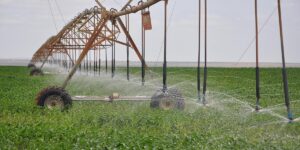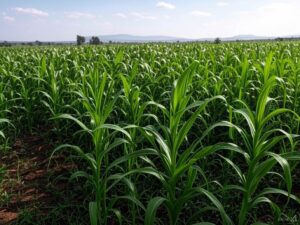
On 14th January 2025, Hon. Mutahi Kagwe, President Ruto’s nominee for Kenya’s ministry of agriculture was being vetted by a committee of the parliament. The former minister for information and communication which is an IT related ministry and at the same time former CS of the ministry of health in his introductory remarks talked about how he thinks he fits in the agriculture docket. He said that when in primary school he was a member of the 4K club. The 4K Club in Kenya was a program that encouraged children to learn about agriculture and contribute to food security. The name 4K stood for the Kiswahili phrase Kuungana, Kufanya, Kusaidia Kenya, which translates to “unite, act, and support Kenya”.
After primary school Mutahi joined Kagumo High school in Nyeri county and joined the agriculture club in the school where the club started a poultry project which enabled the school to introduce eggs to its menu. Despite this proclaimed affinity to agriculture Mutahi joined university to pursue not agriculture but commerce.
After graduation with a bachelors of commerce and later an MBA, he joined agricultural related publishing units including the Farmers Voice magazine of the KFA (Kenya Farmers Association). Mutahi Kagwe explained that these experiences in the agriculture sector make him suitable for the docket of the country’s agriculture ministry. One would wonder which experience he used for the IT and Health ministries but let wait in the parking lot.
In one of his responses to the vetting committee Hon. Mutahi showed some attention to the youth of Kenya and, I my opinion, rightly so. He thought the youth should be engaged in agriculture and quickly added that they have no title to land. He therefore proposed that the free government land should be leased to them. In essence Mutahi Kagwe was saying that Kenyan youth should be appetized to participate in farming.
My experience as the current chairman of the African Agribusiness Incubators Network (AAIN) with headquarters in Ghana and offices in Kenya, Uganda, South Africa, Zambia, Ethiopia and Egypt tells me that to motivate many youths in Africa to enter into farming the sector must be made really “sexy”. Indeed, it can be made so but to me there are alternatives along the entire agricultural value chain that could be exploited.
To start with, catching them young is key to boosting young people’s interest in farming. The current college graduates were not well captured for farming when they were young. Even those who had some interest in agriculture while at primary and secondary school like Hon. Mutahi Kagwe did not end up pursuing it as a future career and higher levels as indeed exemplified by Mutahi Kagwe. In many schools, including my own primary school, agricultural activities like digging were used as a “dirty and hard” punishment for wrong doing in school and this demotivated many pupils from developing a liking for farming.
The competency-based curriculum (CBC) has the good germs of reversing the situation but it faces some challenges which need to be addressed. I have visited a number of primary schools and observed that the CBC school gardens and farms allow children to get their hands dirty by raising crops and livestock. This experience, if well woven into the fabric of childhood, will positively impact on how young people view agriculture and farming. https://www.tiktok.com/@henrybwisa/video/7393073803628170502?is_from_webapp=1&sender_device=pc&web_id=7302027358739088902
Back to the ministry of agriculture nominee. He suggests that government land should be leased to the youth to practice farming. Kenya’s youth make up about 80% of the population. I am wondering if there is enough land to lease to all of them and future generations. In my opinion we must think beyond farming, beyond tilling the land even as we stay on the agricultural value chain.
Let’s look at some facts. A handbag from China retails at kSh5,000 in Kenya. Leather shoes from India go for Ksh 20 000. Leather belts from India are selling like hot-cakes in Kenya. A 500 ml avocado imported body oil costs Ksh. 1500 while 100 ml imported cooking avocado oil costs KES 695.00. A 5 kg packet of imported charcoal briquettes made from avocado peels costs Ksh 995.00 and a 750 ml of imported banana wine fetches Ksh. 1750. 1 L of imported Coffee Liqueur costs Ksh 4050 while imported instant coffee cost Ksh. 1495 for 200ml.

Now, do not look at these as just prices; they are actually foregone wages to Kenya’s disillusioned graduates without gainful employment while the country ships out animal hides to China and India, avocado to the Netherlands, coffee to Italy all these being exported employment opportunities.
The message is that if Kenya can invest in agripreneurship and not just agriculture; in value-addition and not just farming of the above-mentioned crops and indeed others like tea, fish or even tomatoes then many jobs can be created at home. Therefore, alongside looking for land to lease to the youth as Mutahi Kagwe suggests, strategies to engage the youth in off farm agricultural activities say in agri-manufacturing could absorb more youth than those going to farming.
Let me give a personal case study. In 2014 I won my university research grant for applied research on a cluster approach for rural industrialization. I set up a demonstration plot and engaged farmers in my Kibingei ward of Kimilili subcounty of Bungoma county in growing sunflower. I then bought the sunflower seed and using a locally manufactured (by jua kali youth) oil press, I pressed oil and engaged some youth to make bar soap out of it. I engaged other youth to make animal feed out of the cake that remains after pressing the oil. With the feed available I set up three demo activities: dairy, poultry and fish demo. I then engaged some youth to set up a biodigester that used cow dung, chicken droppings and fish gut to produce biogas which I used in my house as I abandoned the expensive electricity. The slurry that remained in the biodigester made excellent organic fertilizer that I sold to sunflower farmers to complete a circular economy model.
I named my project Bungoma 4F industrial cluster i.e. Food (the vegetable oil), Feed (from the cake), Fuel (the biogas) and Fertilizer (the slurry). I made presentations to my county but to date the concept, which can be replicated by other counties, remains in my research report on the shelves of my university library.
The rich cluster-based value addition activities along the dairy, poultry and fish value chains and multiplier activities such as packaging, oil press fabrication is dormant. https://youtu.be/KV5nFuHRI0U; https://youtu.be/fCYIv536mLc
As chairman African Agribusiness Incubators Network, I can report that through agribusiness incubation we at the AAIN incubated Uganda’s university students to make coffee liquor and vacuum bananas for export. In Kenya we attempted incubating the youth in sorghum products. Agribusiness incubation is the process that focuses on nurturing innovative, early- stage enterprises that have high potential for growth and to become competitive agribusinesses by serving, adding value to or linking to farm producers.
In conclusion even as Kenya thinks of creating a conducive environment to engage the youth in farming, there are more “sexy” agricultural opportunities along the later stages of the agricultural value chain. A policy to limit export of agricultural raw materials could be a starting point to promote value addition activities.
https://www.youtube.com/@henrybwisa
https://www.tiktok.com/@henrybwisa
